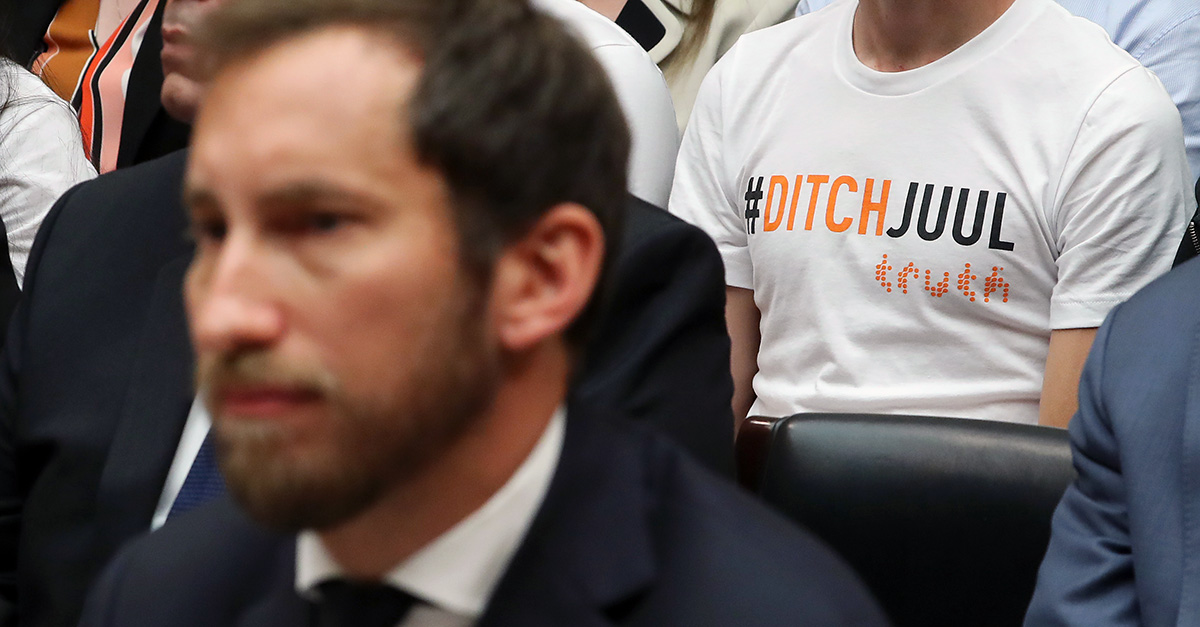Why the FDA needs to regulate e-cigarettes now
As the tally of vaping-related deaths and cases of severe lung illness rises — 18 and 1,080, respectively, at last count — youth e-cigarette use continues its rapid growth.
More than a quarter of high schoolers — 27.5% — are now vaping, according to preliminary data from the 2019 National Youth Tobacco Survey. New 2019 data from another national survey shows that youth vaping has more than doubled since 2017, with more than 1 in 9 high school seniors reporting vaping nicotine on a near-daily basis, signaling a growing youth addiction crisis.
This crisis could have been prevented if the Food and Drug Administration had done its job of regulating e-cigarettes, instead of allowing them to stay on the market without undergoing a review of their public health impact. Thousands of young people are rallying on their campuses and in their communities across the country for a National Day of Action to call on the FDA to ban all flavored e-cigarettes, including mint and menthol, and fully regulate e-cigarettes. They are also urging their peers to quit, or not start using, JUUL, the most popular e-cigarette that is driving the youth vaping epidemic.

Here’s why young Americans can’t wait any longer for the FDA to act:
Flavored e-cigarettes, including mint and menthol, attract kids
Flavored e-cigarettes, including mint and menthol, attract kids
Almost all youth who vape — 97% — use flavored e-cigarettes.
This is no surprise: it has long been proven that flavored tobacco products attract youth. While federal law banned characterizing flavors, excluding menthol, from cigarettes in 2009, no such ban on e-cigarettes exists, allowing vaping companies to capitalize on kid-friendly flavors.
Dozens of public health and medical organizations support removing flavored e-cigarettes from the market, as the Trump administration proposed. This ban must include mint and menthol flavors, which JUUL still sells in stores after relegating other flavors to online-only sales in response to previous backlash in 2018.
Mint was already popular with young people when flavors like fruit medley, mango and crème brulee were sold in stores, and now it has become even more popular. A 2018 Truth Initiative® survey found that mint was among the top three favorite flavors among young JUUL users aged 12-24, meaning they chose it last time they vaped. New research shows that mint and menthol e-cigarette use overall rose from 51.2% in 2018 to 63.9% in 2019, as other sweet and fruity flavors became harder to come by.
No one knows all of the long- or short-term health effects of e-cigarettes
What are the long-term or short-term health effects of JUULing
The FDA investigations into cases of vaping-related deaths, severe lung illness and seizures underscore the incredible lack of knowledge about the health effects of vaping. New research is also beginning to shed light on possible ties to lung cancer in mice.
At least 60 chemical compounds have been found in e-liquids, and more are present in the aerosol produced by e-cigarettes. Researchers have identified several substances which are either harmful or potentially harmful to e-cigarette users. E-cigarette flavors — even those approved for ingestion — have not been studied for toxicity if inhaled over long periods of time. Many e-cigarette flavorings contain chemicals that are known to be respiratory irritants, and research has found that some flavors are potentially more toxic than others. In fact, according to a recent Yale and Duke University study, the chemicals found in certain JUUL e-liquids produce potentially harmful acetals that may cause irritation and inflammation when heated and inhaled.
Before he was replaced with a Big Tobacco executive from Altria, the former CEO of JUUL even admitted in an on-camera interview that the long-term effects of e-cigarettes are unknown.
Young people who vape are risking nicotine addiction
Young people who vape are risking nicotine addiction
The average nicotine concentration in e-cigarettes sold in U.S. retailers more than doubled from 2013 to 2018, according to a study by Truth Initiative and the Centers for Disease Control and Prevention. JUUL’s nicotine content is one of the highest among e-cigarettes on the market and it has driven much of the increase in nicotine content in e-cigarettes.
High-nicotine e-cigarettes — like JUUL and the many similar products and copycats — could worsen the effects of nicotine exposure, which can harm brain development, alter nerve cell functioning and change brain chemistry in ways that make adolescent brains more susceptible to other addictive drugs.
The e-cigarette industry targeted youth and can’t be trusted to regulate itself
The e-cigarette industry targeted youth and can’t be trusted to regulate itself
In addition to its youth-oriented marketing launch, in which JUUL spent more than $1 million to market the product on the internet, JUUL programs targeted children as young as those in third grade by funding summer camps, visiting schools and paying community and church groups to distribute their materials, according to documents and testimony from congressional hearings about JUUL’s role in the youth e-cigarette epidemic.
JUUL has worked to block and prevent FDA regulations, investing more than $1 million in lobbying efforts in the second quarter of 2019 alone. It also invested more than $4 million to try to beat a San Francisco ballot initiative to stop sales of e-cigarettes in the city.
Meanwhile, JUUL has claimed that it is targeting adult cigarette-users who want to stop smoking, but it has failed to subject its products to the level of independent, clinical investigation needed to substantiate any claims of effective cessation, nor has the company applied to the FDA to be approved as a product to help smokers quit.
JUUL, which is part-owned by tobacco giant Altria, is officially Big Tobacco, an industry with an insidious history of targeting kids with addictive products.
Young people can join the thousands of other teens taking part in the National Day of Action by:
- Signing a pledge to tell JUUL to take responsibility for their actions.
- Sharing their truth on social media and telling everyone why they should #DITCHJUUL for good.
For more information on JUUL and the e-cigarette epidemic, read more of our research and analysis.
More in emerging tobacco products
Want support quitting? Join EX Program
By clicking JOIN, you agree to the Terms, Text Message Terms and Privacy Policy.
Msg&Data rates may apply; msgs are automated.



